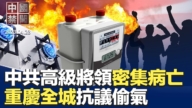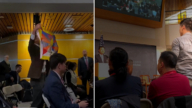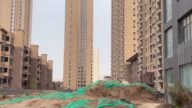【新唐人2013年11月18日讯】中共密不透风的三中全会闭门会议结束后,被外界评论没有兑现改革承诺。周五,中共全面深化改革的决定也匆匆出炉,被称为毫无新意。就所谓农村土地改革而言,专家认为,新公布的决定,只不过把以前的强占土地现象政策化,为裙带集团到农村圈地撑起了保护伞。而真正意义上的土地改革,应该是把土地还给农民。
《中共中央关于全面深化改革若干重大问题的决定》,开篇就用“决心之大”、“变革之深”、“影响之广”,“前所未有”,“举世瞩目”等诸多充满“伟光正”的优美词句,把《决定》本身赞美了一番。不过外界认为,撇开中共历来雷声大雨点小的作风,单就文字而言也谈不上改革。
所谓的《决定》第6条29款写道,坚持农村土地集体所有权,维护农民土地承包经营权,发展壮大集体经济。稳定农村土地承包关系并保持长久不变。
大陆《农产品市场周刊》网站负责人黄良天:“不看好,不看好,没有所谓的改革,只要坚持农村土地的集体所有制,这就没有改革可言,共产党掌权以后,一直用集体这个名义,掠夺很多东西变成自己的党产,现在农民从党里头承包土地,变成共产党把土地资源全给占了,它想给谁就给谁,给你多少年,就给多少年。”
《决定》第3条第11款写道,建立城乡统一的建设用地市场。在符合规划和用途管制前提下,允许农村集体经营性建设用地出让、租赁、入股。
大陆《农产品市场周刊》网站负责人黄良天担心,如此下去,中国农村的土地只能种钢筋水泥,而不能种粮食。
黄良天:“那么现在这个决定一出来,就把模糊的产权变得很明晰了,跟城市郊区的土地一样照样可以卖。谁来卖﹖谁有这个支配权﹖没有说,没有说呢,像往常一样就是政府,或者政府在农村的所谓组织的带头人—党支部书记。农民个体而言,面对的环境更加险恶了。”
中国专栏作家朱智勇在他的微博中写道,伟大的土地改革又要开始了,在经历了一轮残酷的城市圈地运动之后,农民的土地再一次被系统瞄准。……不在人生权利上做出改变,眼睛盯着他们那一点可怜的土地,用心何在?政府能承诺流转收益全部归农户吗?
今年春天,中共党媒《农民日报》刊登了一篇题为《没有土地的村庄,谁来为失地农民买单》的文章。文章中详细的描述了一开发区领导,动员土地承包者集体签订了土地流转委托书,几年后,又变相收回了村民还有16年承包期的土地使用权和经营权,再以每亩加200元的价格,把后面的租期倒卖给了地产商。
当地领导利用恐吓、欺诈、强压、各种软硬兼施的方法,用土地流转的方式圈走整个村庄土地,导致整个村庄土地闲置,绿色的田野裸露在外,农民无法谋生。
黄良天:“一个党的会议,你怎么能支配农村的土地呢﹖只要中央一出一个什么旗号或口号,就有一大批跟政府有勾结的商家,去农村夺取土地资源,现在已经非常严重了。”
而各地通过打死、甚至活埋等方式,强抢农民土地的现象,更是屡见不鲜。
黄良天指出,只有把本来属于农民的土地还给农民,实现土地私有化才能从根本上解决问题。
“北京师范大学”MBA导师段绍译告诉《新唐人》,圈地现象肯定存在,但是中共很惧怕私有化。
大陆经济学家华生最近接受媒体采访时说,土地改革是为几亿进城农民工安居服务的,为留下来务农的农民服务的,不是为资本下乡圈地服务,不是为地方政府和官员好大喜功服务,这就是试金石。
采访编辑/刘惠 后制/葛雷
New Land Reform Becomes Protection of “Enclosure Movement” in Rural Areas!?
Following the closed-door Third Plenary session, the Chinese
Communist Party has been widely criticized for not
fulfilling its previous promises on reform.
In the face of heavy criticism, the party hastily released
the so-called “reform decision” document but still
received little recognitions.
Specifically, experts say that the recent rural land reform
“decision” is no more than policy giving official protection to
interest groups who forcibly seize lands from peasants.
Any real land form must return land ownership to peasants.
The CCP has announced it’s document of the “Decision of
the CCP Central Committee on Several Important Issues of
Comprehensively Deepening Reform”.
From the start, the document uses flashy terms such as
“unprecedented”, “huge determination”, “deep reform”, “wide
influence”, and “focus of world attention” to glorify itself.
However, outsiders say that even putting aside the party’s
tradition of “much said and little done”,
the “Decision” still fails to amount to real reform.
In Article 6, Paragraph 29 of the “Decision”, it says
“Stick to collective ownership of rural lands”,
“Protect peasant’s rights of land contracting”
and “Develop collective economy”.
The party wants to maintain control of and continue
the current land contracting system in rural areas.
Huang Liangtian, director of Chinese website Farmers’
Market Weekly: “I don’t like it. There is no real reform as long
as the collective ownership of rural lands does not change.
Since taking power the CCP has always been plundering
properties for itself via “collectivization”.
Now peasants have to contract with the party for land use.
The party has occupied all land resource and it can give it
to anyone for any time span at will.”
In Article 3, Paragraph 11 of the “Decision”, it says
“Construct a unified land market for construction”,
“Permit transfer, leasing and sharing of collective-owned
farm lands for construction without violation of planning
and use control.”
Huang Liangtian, director of blocked Chinese website
Farmers’ Market Weekly, worries that following that policy
all farm lands in China will only end up
“growing” reinforced concrete instead of crops.
Huang Liangtian: “The announced ‘Decision’ now makes
the previously unclear property rights become clear,
allowing rural land to be sold like urban land.
Who will sell them? Who has the authority to do that?
This is not mentioned.
Therefore the answer is just as usual: governments or
leaders of their rural agencies, the party branch secretaries.
For individual peasants, they are now facing
an even worse situation.”
Chinese column writer Zhu Zhiyong wrote the following
on Weibo: “Another round of great land reform has begun.
After a series of cruel land grabs in cities,
now peasants’ lands have become the next target…
What is the motive of aiming at those poor people’s
only property without improving their rights?
Can the authorities promise to give all interests from land
transfers to rural residents?”
This spring, party mouthpiece Farmers’ Daily published
an article titled “Villages without lands: Who will pay
the bill for peasants?”
The article told the following story in detail. A leader of
an economic development zone persuaded local land
contractors to collectively sign a “letter of authorization
for land transfer”.
Several years later, he secretly retracted villagers’ remaining
16 years of land use and management rights.
Finally, the official sold those tenancy periods to developers
at a price of 200 yuan per mu (about $192 per acre).
Local leaders managed to grab all lands of the village
via land transfer operations accompanied by intimidation,
deception, suppression and every other possible means.
Finally all lands of the village were left unused,
with green fields untended and farmers unable make a living.
Huang Liangtian: “How can a party meeting decide how
to use rural lands?
Once the CCP’s Central Committee says something, a large
group of crony enterprises will flock to seize
rural land resources. This problem has now become very serious.”
Moreover, it is not rare to see peasants being beaten to
death or even buried alive when they resist forcible land
expropriation all over China.
Huang Liangtian says that the only solution to solve
the problem is to return land ownership to peasants
and implement land privatization.
Duan Shaoyi, an MBA instructor of Beijing Normal University,
told NTD that the lad grab phenomenon definitely exists, but
the CCP is very afraid of implementing land privatization.
Chinese economist Hua Sheng recently said in an interview
that land reforms should serve for the country’s hundreds of
millions of peasant workers in cities and farmers.
It should not serve to aid in rural land grabs for capital,
or aid local governments and their officials in making
unrealistic achievements.
In this sense, this issue is a real test to the party leaders.




























